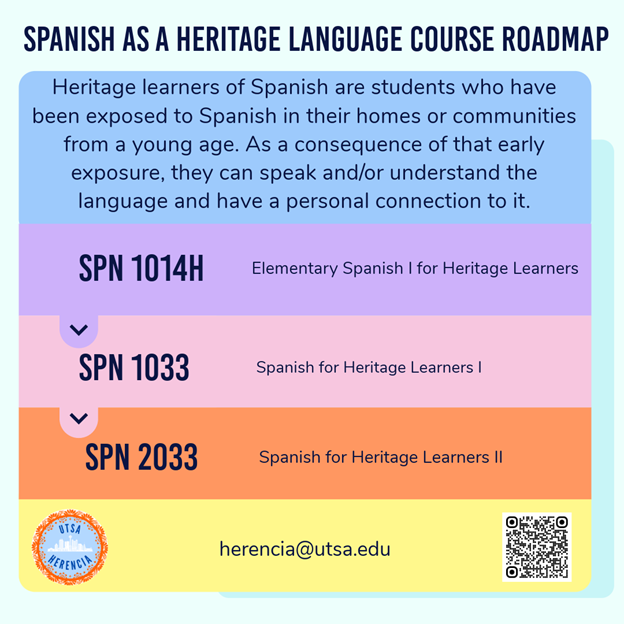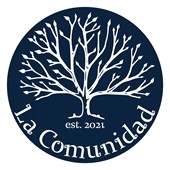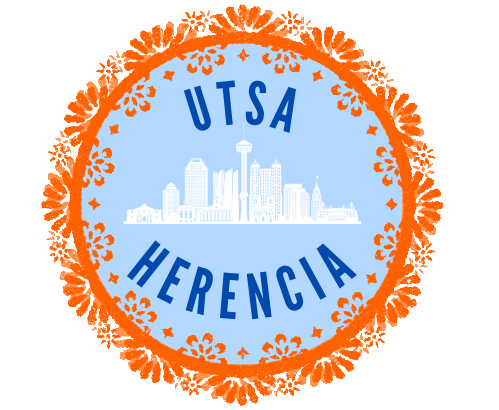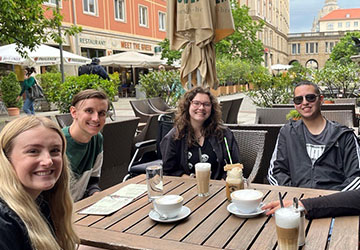Welcome to the Spanish as a Heritage Language Program at UTSA!
- Were you exposed to Spanish in your home or community while growing up?
- Can you understand the main points of a conversation in Spanish?
- Is Spanish an important part of your culture and/or identity?
If you answered yes to any of the questions above, the Spanish as a Heritage Language Program is for you!
Spanish as a Heritage Language (SHL) refers to a specialized approach to teaching Spanish that caters to heritage learners—individuals who have been exposed to Spanish in their homes or communities from a young age. These learners typically have a personal or familial connection to the language due to their cultural background and/or upbringing.
In the SHL Program, we are dedicated to advancing critical language awareness, employing ethical language practices in teaching and learning, and cultivating collaborative approaches to preserving and sharing the cultural and linguistic legacies of local Spanish-speaking communities in San Antonio, Texas, and across the United States. Our team is committed to supporting your academic journey and providing a supportive and engaging learning environment!

Fulfilling the COLFA Second Language Experience
Need to fulfill the COLFA Second Language Experience? Students that complete the SHL sequence can fulfill this requirement with three courses or less! Take the SHL Placement Test to determine which course is best suited to meet your educational needs. You will be directed to SPN 1014 Heritage, SPN 1033, SPN 2033, or the challenge exam.
Classes Offered
Our curriculum emphasizes student-centered, place-based, and asset-based approaches. We offer a range of classes tailored to meet the needs of heritage learners, including:
For students who have been exposed to Spanish and wish to further develop their conversational and listening skills in an encouraging and culturally rich environment. Students are introduced to the cultural, historical and social connections to Spanish as a Heritage Language in the physical and digital world. Broad survey of major historical, disciplinary, social, cultural and community issues related to language in various contexts including current and potential applications in real world experiences. Taught in Spanglish.
This course expands students’ written and oral abilities for real-world communication. Students work collaboratively on oral history and digital projects that engage with local, national, and global Spanish varieties. Prerequisite: SPN 1014, placement test, or consent of instructor.
Introduction to the rich cultural, artistic, and linguistic heritage of Spain, Latin America, and Spanish-language borderlands. Use of analytical terminology, advanced vocabulary building, and further development of reading, writing, and speaking skills. Prerequisite: SPN 2023, SPN 2033, or SPN 3003 or the equivalent, or consent of instructor.
Study of the Spanish language in contact with other languages across the globe. Emphasizes writing and research skills, including multilingual research projects on questions of community identity, language, culture, history, and professions. Prerequisite: SPN 2033 recommended.
Methodologies and practices to analyze analog and digital material and archives that center Spanish language and literature in the Americas from the 1800s to the present. Prerequisite: SPN 2033.
Study of periods, movements, themes, styles, authors, and literary works from the colonial period to the present of the US-Mexico border and Latines in the United States through social, historical, literary topics and interdisciplinary theoretical frameworks. Prerequisite: SPN 2033 or consent of instructor.
The analysis of the Spanish language as used by native or heritage speakers in the United States, from a linguistic, pragmatic and sociolinguistic perspective. Particular attention given to the Spanish spoken in Texas. Prerequisite: SPN 3013, SPN 3113, or consent of instructor.
Collaboration with local businesses, non-profit organizations, and/or cultural and historical centers on hands-on, project-based, and community-oriented work. Prerequisite: SPN 3063.
Praxis and methods of multilingual digital storytelling through a variety of mediums and tools. Evaluation of various digital media such as podcasts, digital archives, digital mapping, text analysis, data visualizations, and multimodal texts.
Study of specialized topics regarding Spanish language-based cultures and literatures of borderlands, including Spanish in the United States. Prerequisite: SPN 3233.
Study of specialized topics regarding Spanish language-based cultures and literatures of borderlands, including Spanish in the United States. Prerequisite: SPN 3233.
Special topics course of a thematic topic or issue in the digital humanities focused on the Indigenous, Hispanic, Latin American, Latinx, Caribbean, Borderlands Digital Humanities subfields. Prerequisite: SPN 4183 (or SPN 3133 in previous catalogs).
An in-depth study of the contact variety of Spanish spoken by Mexican Americans in the U.S. Southwest, including San Antonio. Complementary descriptive and sociolinguistic approaches are incorporated.
Study in selected areas of Hispanic linguistics not normally available as part of regular course offerings. May be repeated for credit when topics vary.
Clubs & Communities

La Comunidad is more than just a student organization, it is also a Living Learning Community (LLC)! This themed residential community offers students a unique and enriching immersive environment where Spanish varieties and cultures are not just studied but lived and experienced on a consistent basis. Proudly sponsored by the SHL Program, La Comunidad provides opportunities for cultural enrichment, language practice, and community engagement. Connect with fellow students and participate in exciting social events and activities throughout the academic year.
Contact Us
For more information about the SHL Program, please email herencia@utsa.edu or contact Dr. Stephanie Brock González. We look forward to welcoming you to the SHL Program!

Dr. Stephanie Brock González
Director, SHL Programstephanie.gonzalez4@utsa.edu



